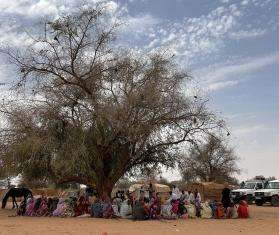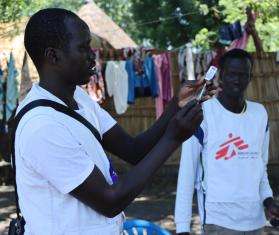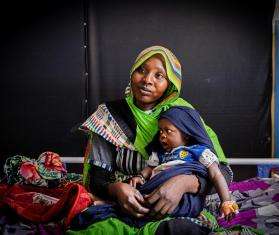Doctors Without Borders/Médecins Sans Frontières (MSF) calls for urgent medical supplies and respect for International Humanitarian Law protecting medical facilities
BRUSSELS/NEW YORK, NOVEMBER 27, 2017—Hundreds of people have been wounded in intense bombing and shelling in the besieged East Ghouta enclave near Damascus, Syria, in the last two weeks, creating a disaster for patients in need of medical treatment, the international medical humanitarian organization Doctors Without Borders/Médecins Sans Frontières (MSF) said today.
MSF, which does not have its own medical staff in East Ghouta, provides support to field hospitals and clinics serving the local population. From November 14 to 26, five MSF-supported field hospitals in East Ghouta treated 576 wounded patients and recorded 69 deaths. This includes patients from 24 mass casualty influxes to these facilities. About a quarter of the wounded and the dead are women or children under 15 years old.
These figures do not account for the total numbers of people killed and wounded in East Ghouta as there are other facilities in the area that MSF does not regularly support.
"During this period of intense conflict, medical care is urgently needed for men, women, and children," said Bertrand Perrochet, MSF director of operations. "But the services in East Ghouta are stretched beyond their limits. Even those who risk trying to reach a hospital or clinic may find that it has reduced services due to the fear of bombing, and many facilities are consuming exceptional amounts of medical supplies that will be difficult to replenish."
The availability of medical care in East Ghouta has declined due to bombing, shelling, and fear of attacks. A major field hospital in Kafr Batna, East Ghouta, that MSF has been supporting from abroad since 2013, was hit on November 20 by two rockets, destroying a water tank and solar panels, causing some damage to the in-patient department, and putting one ambulance out of service. Fortunately, there were no serious injuries to staff or patients in this incident, but the hospital suspended its services for two days to enable essential repairs.
Another clinic and two field hospitals supported by MSF temporarily suspended their non-emergency services from November 15 to 18 out of concern for the safety of medics and patients.
MSF assists 21 medical facilities in the area with medical supplies and has built up a local reserve of medical supplies for distribution in times of critical need. These stocks are now being used rapidly, with some items nearly or completely used up, such as blood bags, dextrose IV-fluid pouches, large-size examination gloves, iodine, and oral pediatric antibiotics. Most of the facilities MSF is in contact with report needing more supplies, not only for treating the wounded but also for treating sick patients who constitute the majority of urgent cases. If these facilities cannot obtain essential medical supplies, treatment options will further decline, putting more critical patients at risk of deterioration or death.
The pervasive fear of being hit in the near-constant bombing and shelling means people needing medical care and medical personnel are staying at home. Many patients are not getting the care they need, and medical facilities that MSF supports are increasingly short-staffed.
"The medics we support and their patients need to be safe in hospitals and clinics," said Perrochet. "But even if people can get to a health facility and can be safe there, without a huge effort to resupply the area with medical essentials, the medics' capacity to save lives will be increasingly limited."
MSF calls for due precautions by all belligerents, in accordance with international humanitarian law, to avoid hitting civilians and civilian infrastructure including hospitals and residential areas.
MSF calls for the government of Syria to authorize the supply of medicines and medical material without delay into East Ghouta by all agencies or organizations ready to do so.
MSF is aware of reports of shelling by armed opposition groups on central Damascus in November, but because the organization has not yet been granted authorization to work in government-controlled areas, MSF does not have access to on-the-ground information that would enable it to comment on the situation or the needs there.
MSF directly operates five health facilities and three mobile clinic teams in northern Syria, has partnerships with five facilities, and provides distance-support to about 70 health facilities in areas of Syria where MSF staff cannot be directly present. MSF's activities in Syria do not include areas controlled by the Islamic State group since no assurances about safety and impartiality have been obtained from their leadership, nor can MSF work in government-controlled areas since MSF's requests for permission have not yet resulted in any access. To ensure independence from political pressures, MSF receives no government funding for its work in Syria.




